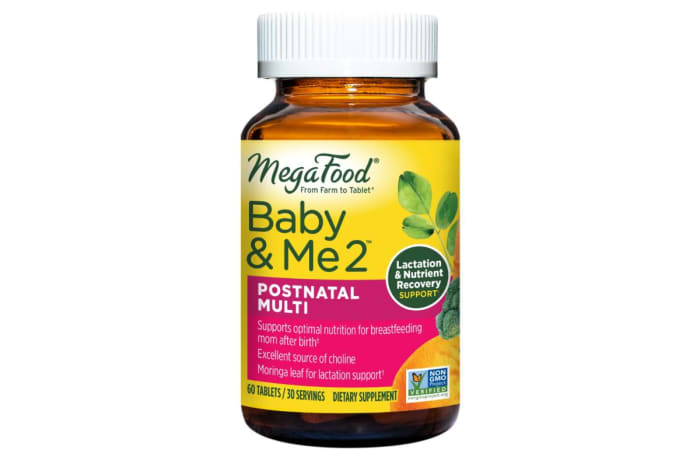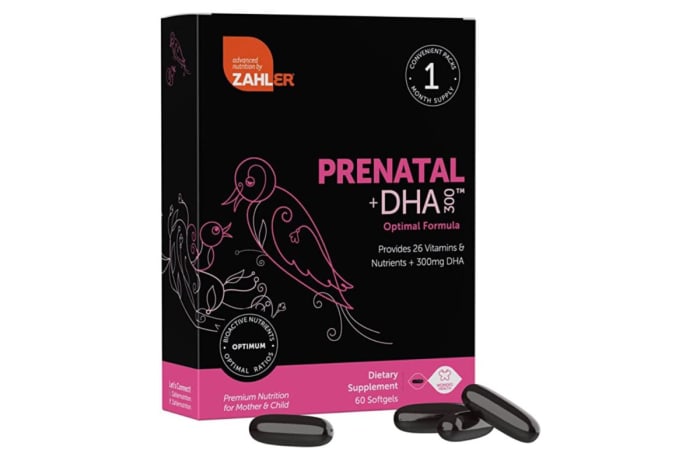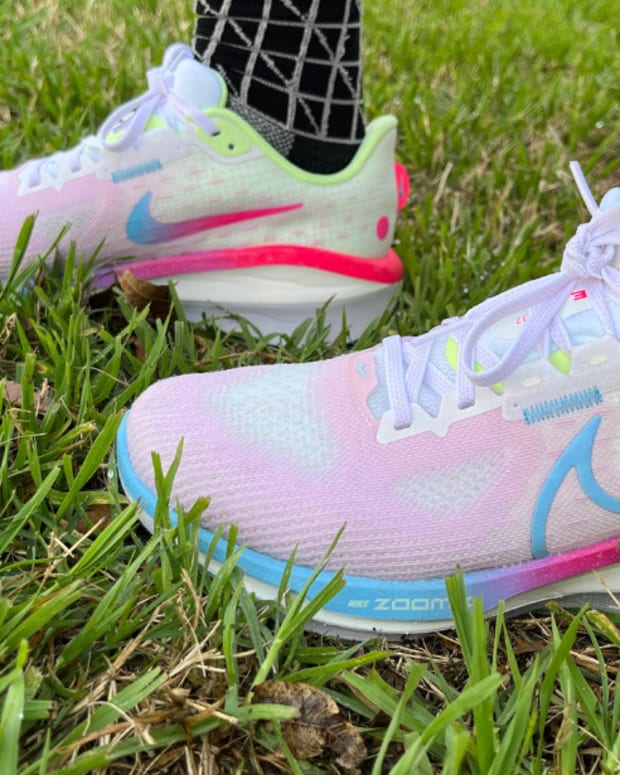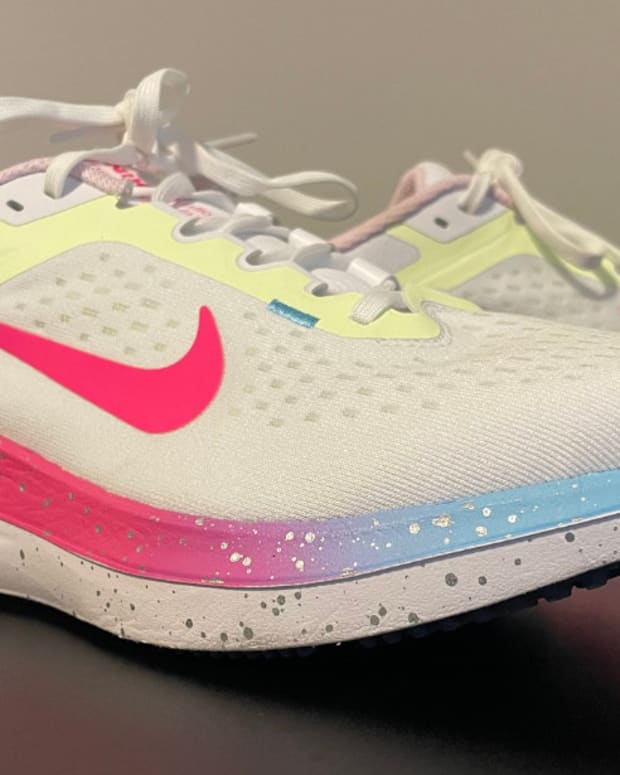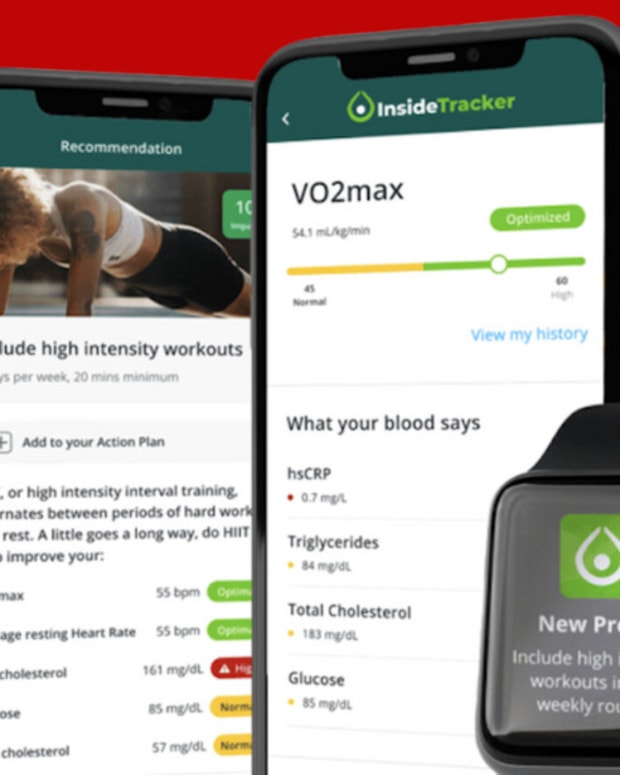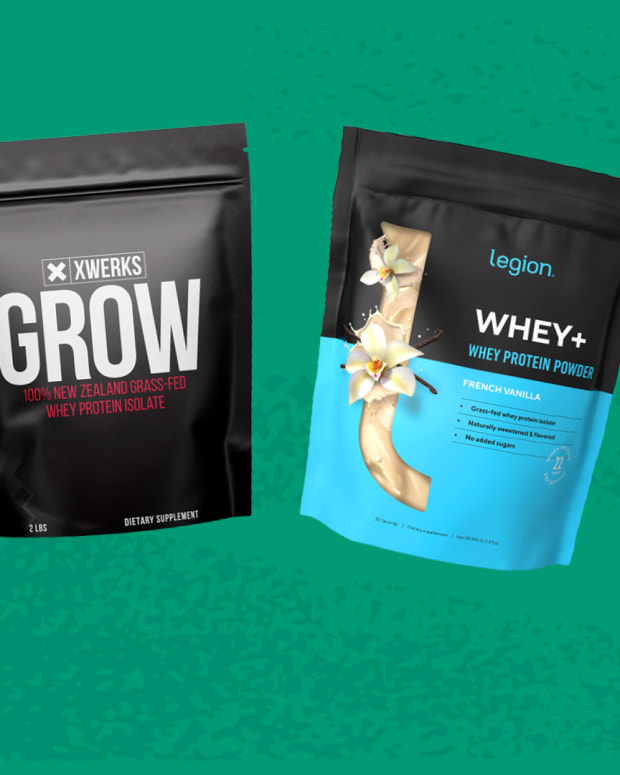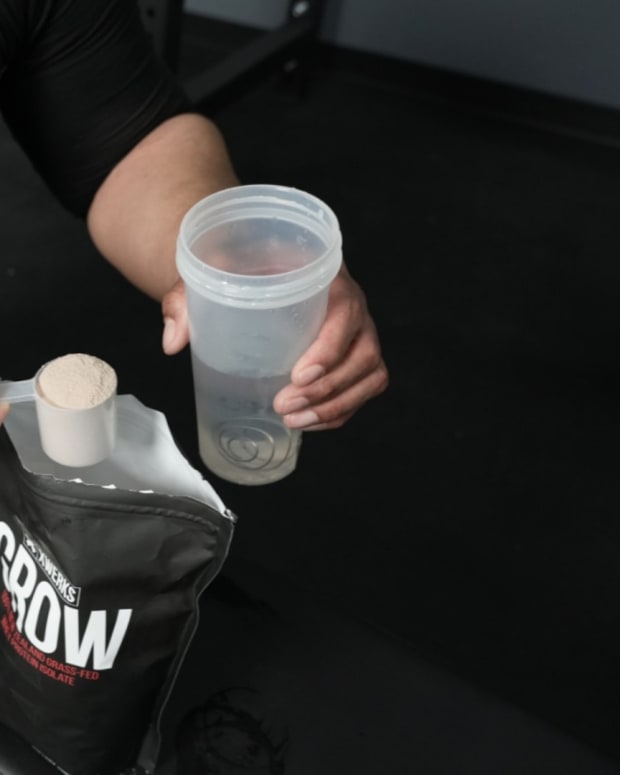The products featured in this article have been independently reviewed. When you buy something through the retail links on this page, we may earn commission at no cost to you, the reader. Sports Illustrated editorial staff are not involved in the creation of this content. Learn more here.
When you’re pregnant, your body’s nutrition needs increase significantly in order to support your growing baby. Most people meet this increased demand by taking a prenatal supplement and increasing their intake of nutrient-rich foods throughout pregnancy.
While prioritizing nutrition during pregnancy is critical, it’s also important to take care of your body after delivery and throughout the postpartum period. This is because your body needs extra nutrients in order to produce milk, heal from delivery and replenish its stores of certain vitamins and minerals. In fact, your needs for many nutrients, including vitamin A, B12, B6, iodine, selenium and choline, are higher during breastfeeding than during pregnancy. Even if you can’t or choose not to breastfeed, your body still needs extra support in order to promote optimal physical and mental wellbeing.
In addition to following a nutrient-dense diet, taking a well-rounded, high-quality postnatal supplement can help you meet your nutrition requirements during the postnatal period.
In this article, we list and explain eight of the best postnatal supplements available in 2024 and why they're so important for keeping you and your baby healthy.
This content is meant to be informative, but should not be taken as medical advice. It is not intended for use as diagnosis, prevention or treatment of health problems. Always speak with your doctor before starting any new supplement or exercise regimen.
Our Picks for the Best Postnatal Vitamins of 2024:
- Best for Sensitive Stomachs: Ritual Postnatal Multivitamin
- Best comprehensive: Thorne Basic Prenatal
- Best Chewable Postnatal Vitamin: Seeking Health Optimal Prenatal Chewable
- Best Subscription Postnatal: Perelel Health Mom Multi Support Pack
- Best Postnatal Protein Powder with Vitamins: KOS Naturals Organic Plant Protein
- Best Vegetarian Postnatal Vitamin: MegaFood Baby & Me 2™ Multi
- Best Vegan Postnatal Vitamin: NATURELO Postnatal Vitamin
- Best Budget Postnatal Vitamin: Nature Made Postnatal Multivitamin + DHA
- Best Postnatal Vitamin with Iron: Zahler Prenatal Vitamin
Best for Sensitive Stomachs: Ritual Essential Postnatal Vitamin
Get 25% off your first month of Ritual! Code: SI25
Key Features:
- Form: Capsules
- Dosage: Two capsules
- Number of servings per container: 30
- Key nutrients: B vitamins, choline, iron, iodine, magnesium, zinc, DHA, vitamins A, C, D3, K2 and E
For those with sensitive stomachs, Ritual’s Essential Postnatal Vitamin is an excellent choice.
Not only is the small two-capsule dose manageable for people who get queasy from swallowing multiple pills, but the capsules are enhanced with a mint essence, which may benefit people who are easily nauseated.
Ritual Essential Postnatal provides a number of nutrients in high demand during the postpartum period, like vitamin E, B12 and iodine, and contains DHA, which is important for maternal health and infant brain development. Not just that, but it’s also vegan, gluten-free and contains no artificial colorants.
Ritual is a subscription-based supplement service, meaning that customers sign up for a monthly supplement delivery. This makes it a convenient choice for busy parents.
Pros:
- Subscription service may be convenient for new parents
- Contains DHA
- Third-party tested for contaminants
- Specifically designed to be easy to tolerate
Cons:
- Expensive compared to other brands
- Lacking nutrients that could be essential for some, like choline and B6
Best Comprehensive: Thorne Basic Prenatal
Key Features:
- Form: Capsules
- Dosage: Three capsules
- Number of servings per container: 30
- Key nutrients: B vitamins, choline, calcium, iron, iodine, magnesium, zinc, selenium, copper, manganese, chromium, boron and vitamins A, C, D3, E, and K
As the first US nutritional supplement company to receive an "A" rating from the Therapeutic Goods Association (TGA), a regulator run by the Australian government, Thorne Research is regarded as a trusted supplement company by doctors and dietitians. It also completes four rounds of testing in in-house laboratories to confirm the identity, purity and potency of their supplement ingredients. What’s more, Thorne’s manufacturing facilities are third-party audited by NSF International— an independent product testing, inspection and certification organization.
For more information on this trusted brand, check out our in-depth Throne review.
Thorne’s Basic Prenatal supplement was designed to support a woman's health from pre-conception through breastfeeding. It provides important nutrients for postpartum women like iodine, B12 and vitamin A.
Thorne Basic Prenatal is also high in iron. Iron needs drop significantly during breastfeeding because most breastfeeding women don’t have a period or may have a very light period. However, if you have low iron levels or iron deficiency anemia, this supplement can help you maintain healthy iron levels after giving birth.
If you’re unsure whether you need supplemental iron, ask your healthcare provider to check your iron status.
Pros:
- Prenatal formula that also supports postnatal nutrition needs
- High in iron
- “A” rating from TGA
Cons:
- May not be appropriate for all women due to high-iron content
- Low in choline
Best Chewable Postnatal Vitamin: Seeking Health Optimal Prenatal Chewable
Key Features:
- Form: Chewable tablets
- Dosage: Two chewable tablets
- Number of servings per container: 30
- Key nutrients: B vitamins, calcium, iodine, magnesium, zinc, selenium, copper, manganese, chromium, molybdenum, betaine anhydrous, milk thistle extract, coenzyme Q10, zeaxanthin, boron and vitamins A, C,D3, E and K
Chewable postnatal supplements are a good choice for people who have a hard time swallowing pills. Seeking Health Prenatal Essentials Chewable supplement contains a number of nutrients needed to support health after giving birth.
Most chewable supplements are high in added sugar, but Seeking Health Prenatal Essential Chewables are sugar free and sweetened with blood sugar-friendly ingredients like monk fruit and xylitol.
This supplement is made with absorbable forms of nutrients important during the postnatal period and is free from gluten, soy and artificial colors, flavors and preservatives. It’s also third-party tested for contaminants like heavy metals.
Keep in mind that this product doesn’t contain choline, a nutrient that’s necessary for infant brain development. It’s concentrated in some foods, like egg yolks, beef, chicken, fish and potatoes, but most women don’t take in enough of this critical nutrient when they’re pregnant or breastfeeding. Pregnant and breastfeeding women require 450 and 550 mg of choline per day, respectively, which is significantly higher than the 425 mg per day recommendation for non-pregnant women.
If your postnatal supplement is low missing choline or only provides a small amount, you’ll likely need to take a separate choline supplement to meet your needs while breastfeeding or make an effort to add choline-rich foods into your diet. Remember to speak to your doctor to determine if choline should be a part of your supplementation routine.
Pros:
- Well-rounded
- Third-party tested
- Easy to take
Cons:
- Doesn’t contain choline
- Expensive compared to other brands
Best Subscription Service: Perelel Mom Multi Support Pack
Key Features:
- Form: Capsules
- Dosage: Five capsules
- Number of servings per container: 30
- Key nutrients: B vitamins, choline, calcium, iodine, magnesium, zinc, selenium, copper, manganese, chromium, molybdenum, potassium, inositol, betaine HCL and vitamins A, C, D3, E and K
Perelel Health is a subscription supplement company that offers OBGYN-created pre and postnatal supplements. A distinctive feature of Perelel Health is the fact that its products are tested for contaminants such as heavy metals and microbes by third-party labs.
Perelel offers a number of products, including a Mom Multi Support pack that provides 30 daily pill packs containing a multivitamin, DHA and EPA, a biotin and collagen-based beauty blend, and an ashwagandha and L-theanine-based mood support blend. The pills are gentle on the stomach and are free from gluten, soy, colorants and synthetic fillers.
Keep in mind that this product is low in magnesium and only covers 22 percent of choline needs for breastfeeding moms.
Perelel Health customers can choose to make a one-time purchase or sign up for monthly deliveries.
Pros:
- Well-rounded
- Third-party tested
- Contains DHA and EPA
Cons:
- Expensive
- Only available online
- Low in magnesium
Best Postnatal Protein Powder with Vitamins: KOS Naturals Organic Plant Protein
Key Features:
- Form: Protein powder
- Dosage: Two scoops
- Number of servings per container: 28
- Key nutrients: Plant-based protein, fruit and veggie blend, digestive enzymes, vitamins and minerals blend
Taking in optimal amounts of protein is essential during the postpartum period. Not only does your body require protein for postpartum recovery, but protein needs increase during breastfeeding to support milk production.
Drinking a smoothie or shake made with a high-quality protein powder like KOS Organic Plant Protein is an easy way for new moms to meet their protein needs.
KOS Organic Plant Protein provides 20 grams of plant-based protein per serving, along with a fruit and veggie blend, digestive enzymes and some added vitamin minerals like zinc and B12. Even more, it contains no erythritol or other sugar alcohols.
It's important to note, however, that this protein powder shouldn't replace a postnatal multivitamin since it lacks potassium, choline and magnesium, among many other important nutrients.
Nevertheless, it makes a good choice for new moms looking for a certified organic, gluten-free, vegan-friendly protein powder that comes in a variety of flavors.
Related Post: Your In-Depth Guide to Pregnancy-Safe Protein Powders
Pros:
- Excellent source of protein
- Vegan-friendly
- Certified organic
- Comes in a variety of flavors
Cons:
- Contains less absorbable forms of certain nutrients, including zinc oxide
- Pricier compared to similar products
Best Vegetarian Postnatal Vitamin: MegaFood Baby & Me 2™ Multi
Key Features:
- Form: Tablet
- Dosage: Two tablets
- Number of servings per container: 60
- Key nutrients: B vitamins, choline, iron, iodine, zinc, selenium, copper, manganese, chromium, molybdenum, boron, lutein, moringa leaf and vitamins A, C, D3, E and K
MegaFood Baby & Me 2™ Postnatal Multi provides vitamins and minerals your body needs during the postnatal period including D3, vitamin C, B12 and choline. It also contains moringa leaf, which some research suggests may help promote milk production.
It covers 36 percent of choline needs and 100 percent of the needs for vitamins and minerals including B12, B6, iodine and selenium for breastfeeding women. However, this supplement is missing magnesium, a mineral that’s critical for overall health and often under-consumed.
MegaFood Baby & Me 2™ Postnatal Multi is vegetarian-friendly, but isn’t appropriate for vegans as the vitamin D included in this product is derived from sheep’s wool.
As a whole, MegaFood supplements are certified organic and non-GMO. Its products are also tested for over 125 pesticides and herbicides.
Pros:
- Well-rounded
- Vegetarian-friendly
- Certified organic
- Easy to find in stores
Cons:
- Missing magnesium
Best Vegan Postnatal Vitamin: NATURELO Postnatal Vitamin
Key Features:
- Form: Capsules
- Dosage: Two capsules
- Number of servings per container: 50
- Key nutrients: B vitamins, choline, calcium, iodine, magnesium, zinc, selenium, copper, manganese, chromium, molybdenum, vitamins A, C, D3, E, and K, and Milk Boosting Herbs Blend
If you follow a vegan diet, it can be difficult to find postnatal supplements that don’t contain animal-derived ingredients. Fortunately, NATURELO offers a postnatal supplement that’s safe for vegans.
NATURELO Vegan Friendly Postnatal Vitamin contains 24 vitamins and minerals derived from plants, like D3 from wild-harvested lichen and calcium from marine algae.
This supplement can help new moms meet intake recommendations for important nutrients that can be low in vegan diets like iodine, selenium, B12 and iron. It also contains a blend of herbs meant to boost milk supply including fenugreek, stinging nettle and alfalfa.
NATURELO Vegan Friendly Postnatal Vitamin is also free from gluten, dairy and soy. All NATURELO supplements are tested by 3rd party labs for potency and purity.
Pros:
- Well-rounded
- Third-party tested
- Vegan-friendly
- High in vitamin D
Cons:
- Low in choline
- Expensive
Best Budget Postnatal: Nature Made Postnatal Multivitamin + DHA
Key Features:
- Form: Softgel
- Dosage: One softgel
- Number of servings per container: 30
- Key nutrients: B vitamins, calcium, choline, iron, iodine, magnesium, zinc, omega-3 DHA, omega-3 EPA, and vitamins A, C, D3, E, and K
Many prenatal and postnatal vitamins are expensive, but Nature Made Postnatal Vitamin + DHA is a budget-friendly option.
It provides vitamins, minerals and omega-3 fatty acids for healthy postpartum growth. Plus, it can be found in most grocery stores and pharmacies.
Nature Made products are United States Pharmacopeia (USP) verified. USP is an organization that sets strict standards for the quality and purity of dietary supplements.
Although this product contains a number of vitamins and minerals necessary for infant and maternal health, it’s low in choline and magnesium.
Pros:
- USP-verified
- Inexpensive
- Widely available in many stores
Cons:
- Low in choline and magnesium
- Uses less absorbable forms of some nutrients, including zinc oxide and magnesium oxide
Best with Iron: Zahler Prenatal Vitamin + 300 mg DHA Softgels
Key Features:
- Form: Softgel
- Dosage: Two softgels
- Number of servings per container: 30
- Key nutrients: B vitamins, calcium, choline, iron, iodine, magnesium, zinc, selenium, copper, manganese, chromium, omega-3 DHA and vitamins A, C, D3, E and K
For women who need extra iron in their diets after pregnancy and during breastfeeding, Zahler Prenatal Vitamin + 300 mg DHA softgels fit the bill. Compared to pregnant and non-pregnant women, iron needs drop significantly when you’re breastfeeding.
However, certain women—like those with iron deficiency anemia and those with low dietary iron intake—need extra support in order to maintain healthy iron levels.
Although certain forms of iron—including ferrous sulfate—can lead to uncomfortable side effects like constipation, Zahler Prenatal Vitamin + 300 mg DHA softgels contain Ferrochel® a form of iron that’s bioavailable to the body and less likely to cause gastrointestinal side effects.
Along with covering 100 percent of your iron needs, this supplement provides a variety of other nutrients including DHA, B12, iodine, and a small amount of magnesium and choline.
Pros:
- Covers 100 percent of iron needs
- Easy to swallow softgels
- Provides DHA
Cons:
- Low in magnesium and choline
- Not third-party tested
Are Postnatal Vitamins Worth It?
While it’s possible for some women to consume all of the nutrients they need during the postnatal period through a carefully planned diet, it can be hard to meet the recommended requirements for nutrients like vitamins, minerals and fatty acids through food alone, especially if you’re breastfeeding.
Breastfeeding is demanding on the body and your needs for most nutrients increase in order to support milk production.
This is why experts recommend that women continue to take a prenatal supplement or start taking a postnatal supplement throughout breastfeeding.
Growing a baby is hard work for the body and studies show that deficiencies in nutrients like vitamin D, vitamin A, iron, choline and magnesium are more common amongst pregnant and postpartum women.
Vitamin and mineral deficiencies can significantly impact your physical and mental health and could contribute to low energy levels, anxiety and depression symptoms, hair loss and more.
So, even if you can’t breastfeed or you choose not to breastfeed, it’s still important to support your own health and recovery with a well-rounded postnatal supplement.
However, it’s important to understand that a prenatal or postnatal vitamin isn’t meant to take the place of a healthy diet. Following a diet that provides the energy and nutrients you and your baby need to feel your best should be a priority during the postnatal period.
The Most Important Vitamins for New Mothers
During the postnatal period, your body depends on a steady flow of vitamins, minerals, amino acids, fats and other nutrients to support your health and, if you’re breastfeeding, the health of your baby.
All nutrients are important, but there are a few that are especially critical during the postnatal period.
Vitamin D
Vitamin D is necessary for maintaining overall health, including the functioning of the immune, skeletal, and cardiovascular systems. Unfortunately, vitamin D insufficiency and deficiency is common during pregnancy and breastfeeding.
Being low or deficient in vitamin D can affect your health in many ways, including increasing your risk for postpartum depression.
There are few foods that contain high amounts of vitamin D, so a vitamin D supplement is usually necessary to maintain optimal levels, which most experts agree lies between 40–60 ng/mL.
Although it’s currently recommended that breastfeeding moms take in 600 IU (15 mcg) of vitamin D per day, research suggests this is not nearly enough to maintain optimal vitamin D levels. Some studies suggest that a daily vitamin D intake between 4,000-6,000 IU is needed in order for breastfeeding women to maintain optimal vitamin D levels in themselves and their babies.
The only way to tell if you’re low or deficient in vitamin D is to have your healthcare provider test your levels. If you’re low or deficient, you’ll likely need a higher dose than what’s found in most pre and post natal supplements.
Choline
If you’re breastfeeding, it’s important to make sure you’re getting 550 mg of choline per day. Choline is a nutrient that’s needed for your baby’s brain development.
Unfortunately, most pre and postnatal supplements don’t contain choline or only provide small amounts. If your postnatal doesn’t contain choline or provides an insufficient amount to meet your needs, you can take a separate choline supplement.
You can also increase your choline intake by including choline-rich foods like egg yolks, fish, dairy, soybeans, meat and poultry in your daily diet.
Iodine
Iodine is essential for thyroid function and supporting your baby's brain development. If you don’t take in enough iodine, it can negatively impact both you and your baby.
Organizations like the the American Academy of Pediatrics and the American Thyroid Association recommend that breastfeeding women take a daily supplement that contains 150 mcg of iodine to help them meet their 290 microgram (mcg) total daily needs.
You can also support your iodine levels by eating foods rich in iodine like fish and dairy products and using iodized salt.
Other important nutrients
In addition to the nutrients listed above, it’s essential to pay attention to your intake of the omega-3s DHA and EPA, B vitamins like B12 and minerals like zinc and magnesium.
DHA and EPA are omega-3 fats that are important for the development of your baby’s central nervous system. They also play important roles in your health, too. It’s currently recommended that nursing mothers take in 250 to 375 mg daily of DHA plus EPA. This can be accomplished by consuming two to three servings of low-mercury seafood like cod, oysters, and salmon per week or taking an omega-3 supplement like fish oil or algal oil.
It’s also important to maintain optimal levels of vitamins and minerals throughout pregnancy and the postnatal period. Unfortunately, having low or deficient levels of some nutrients, like B12, iron, zinc and magnesium, is more common amongst pregnant and postpartum women compared to the general population.
Having low or deficient nutrient stores can negatively impact your physical and mental health. For example, deficiencies in iron, B12, vitamin D and other nutrients can also increase your risk of developing postpartum depression.
Taking a well-rounded postnatal supplement, following a nutritious diet and getting regular checkups by your healthcare provider are some of the best ways to protect against developing nutrient deficiencies during the postpartum period.
How We Chose the Best Postnatal Vitamins
Nutritional content
We chose supplements that provide a variety of nutrients you and your baby need like vitamin D, choline, B12 and minerals like selenium and magnesium.
Ingredient quality
We picked products that use bioavailable forms of nutrients whenever possible.
Most of the postnatal products on this list have been third-party tested to ensure quality and safety.
Customer reviews
We chose postnatal supplements that had mostly positive reviews from customers.
Cost
We made sure to include postnatal supplements at different price points so that you can choose a high-quality product that fits into your budget.
FAQs
What is the difference between prenatal and postnatal vitamins?
Typically, prenatal vitamins contain more nutrients than postnatal vitamins, but postnatal vitamins contain more choline and iodine.
However, every product is different and some postnatals are more comprehensive than others. For example, some postnatals contain a variety of vitamins and minerals plus fatty acids like DHA and EPA, while others contain just a handful of select nutrients.
Some postnatal supplements may also include ingredients meant to support milk production like fenugreek.
You’ll need to look at the supplement facts to see what’s included in the product when shopping for postnatals. Pay special attention to the amounts of nutrients included in postnatals. Some may contain important vitamins and minerals like choline and iodine, but in very small amounts.
Women who have increased nutrient needs—like those following restrictive diets like a vegan diet and women who have health issues that increase nutrient needs like Celiac disease—will need a more comprehensive postnatal to ensure they’re taking in optimal nutrition, especially if they’re breastfeeding.
On the other hand, women who follow a nutrient-dense, well-rounded diet and have no health issues may only require a postnatal that provides a few key nutrients like vitamin D, B12, iodine and choline. Whether you continue taking your prenatal vitamin or you switch over to a postnatal supplement, what matters most is that you’re getting optimal amounts of the nutrients you need to feel your best physically and mentally.
If you’re unsure of what you should be looking for in a postnatal supplement, consider speaking with your healthcare provider or consulting a registered dietitian who specializes in pregnancy and postpartum nutrition.
Is it necessary to take iron and calcium after delivery?
Iron and calcium levels will depend on your specific condition since everyone has different nutrient needs after delivery.
In some cases, women will need an iron supplement after giving birth to replenish their levels of anemia. In women with low calcium intakes or medical conditions like osteopenia, a calcium supplement might be necessary. However, women who follow a well-rounded diet that includes calcium-rich foods like yogurt, beans and dark leafy greens can usually meet their calcium needs through diet alone.
Your healthcare provider can help you decide whether or not you need a calcium or iron supplement. Keep in mind that most postnatal supplements contain very little calcium, so it’s important to make sure you’re getting adequate amounts through your diet.
Should I take vitamin D after giving birth?
Yes, most women need to take a vitamin D supplement in order to maintain optimal levels.
Vitamin D deficiency is extremely common and can negatively impact your health in many ways. You should have your vitamin D levels tested regularly after giving birth so you can supplement with the appropriate dose based on your needs.
If you’re low or deficient in vitamin D, your healthcare provider will recommend a high-dose vitamin D supplement.
What vitamins are depleted during pregnancy?
During pregnancy, delivery and breastfeeding, the body is depleted of several nutrients, including zinc, selenium, vitamin D and calcium.
You can help your body maintain optimal nutrient levels by following a healthy diet that meets your unique energy and nutrient needs and taking high-quality supplements during and after pregnancy.
How long should I take postnatal vitamins after giving birth?
If you’re breastfeeding, it’s recommended to continue taking your prenatal or postnatal supplement until you’ve weaned your baby.
If you aren’t breastfeeding, you can benefit from a postnatal supplement, too.
Although there’s no specific recommendation from professional organizations like the ACOG, taking a high-quality postnatal supplement for at least three to six months after giving birth can help replenish your nutrient stores and reduce your risk of developing a vitamin or mineral deficiency and complications like postpartum depression.
Final Thoughts
If you’re looking for an easy way to take care of your health after you give birth, consider taking a postnatal vitamin supplement. Postnatal supplements are designed to support your health after giving birth and throughout breastfeeding by providing vitamins, minerals, and other nutrients your body needs for optimal health.
If you have questions about postnatal supplements or need help choosing a product that best suits your needs, consider speaking with your doctor or consulting a registered dietitian for advice.
Prices are accurate and items in stock as of publish time.






